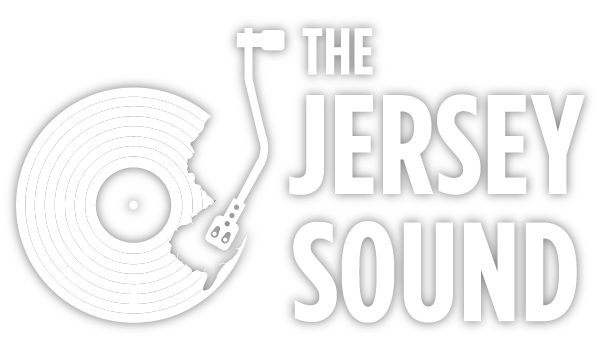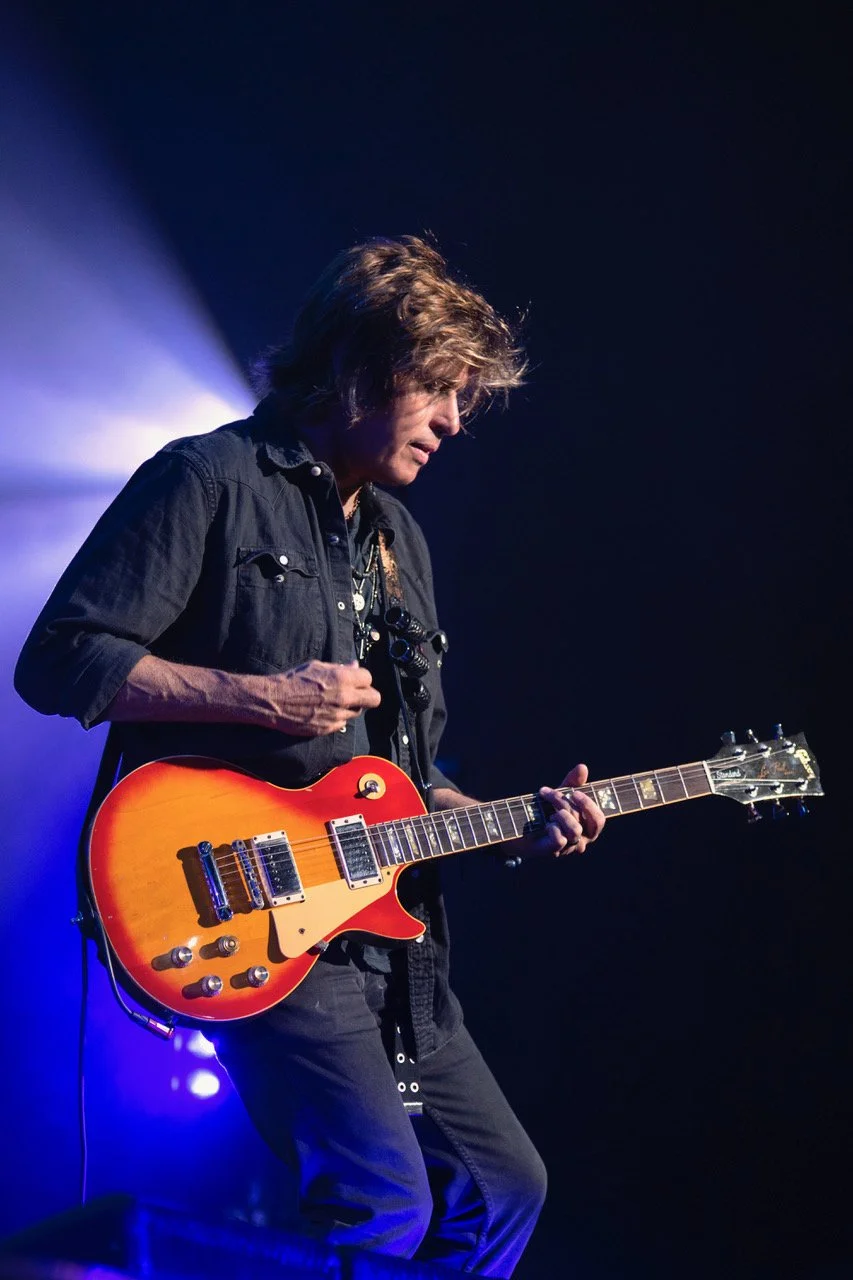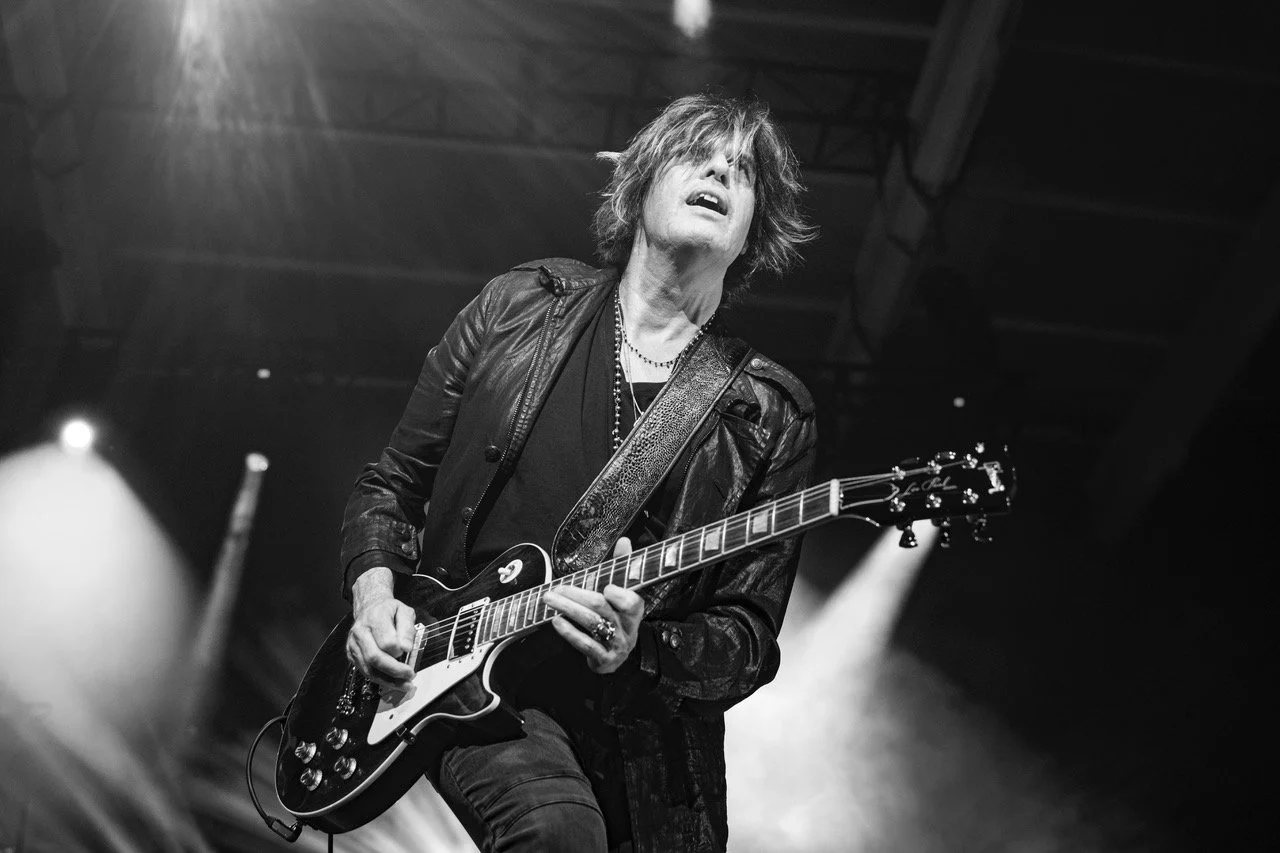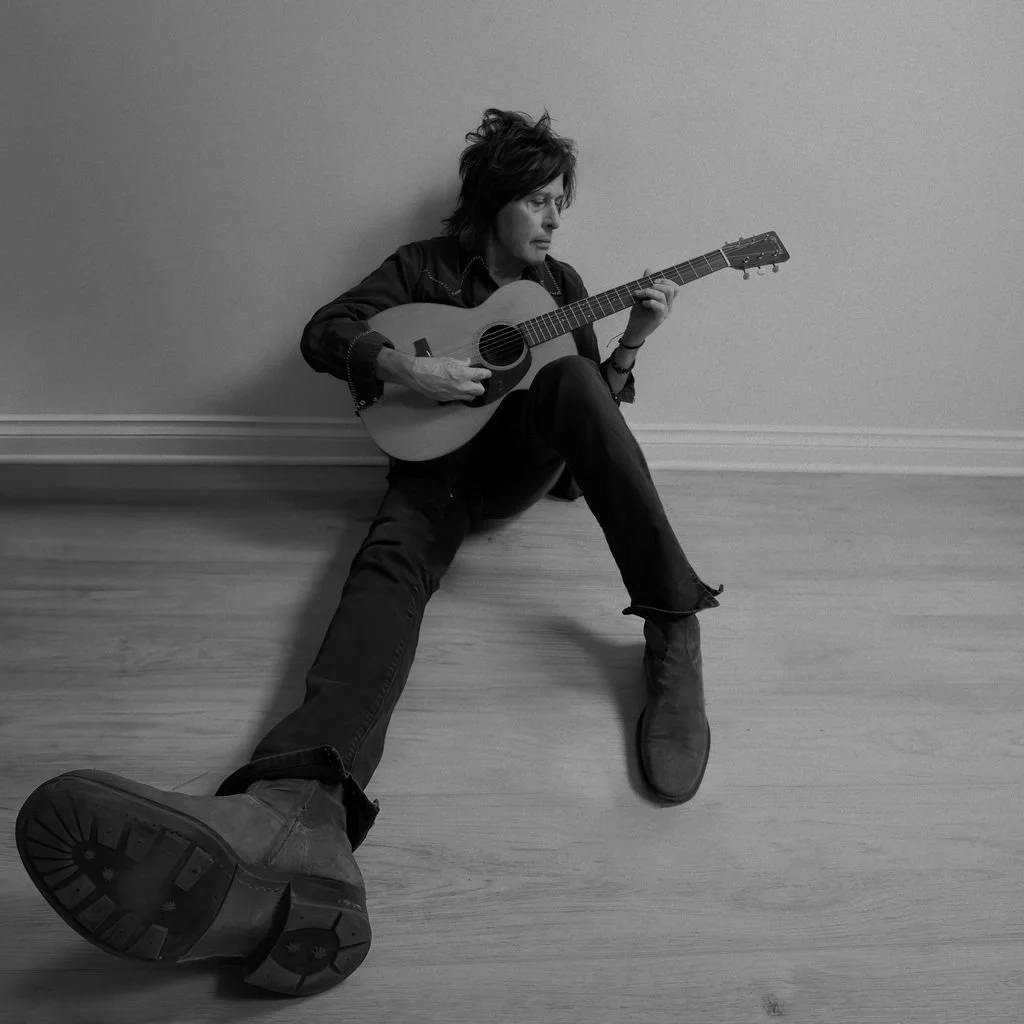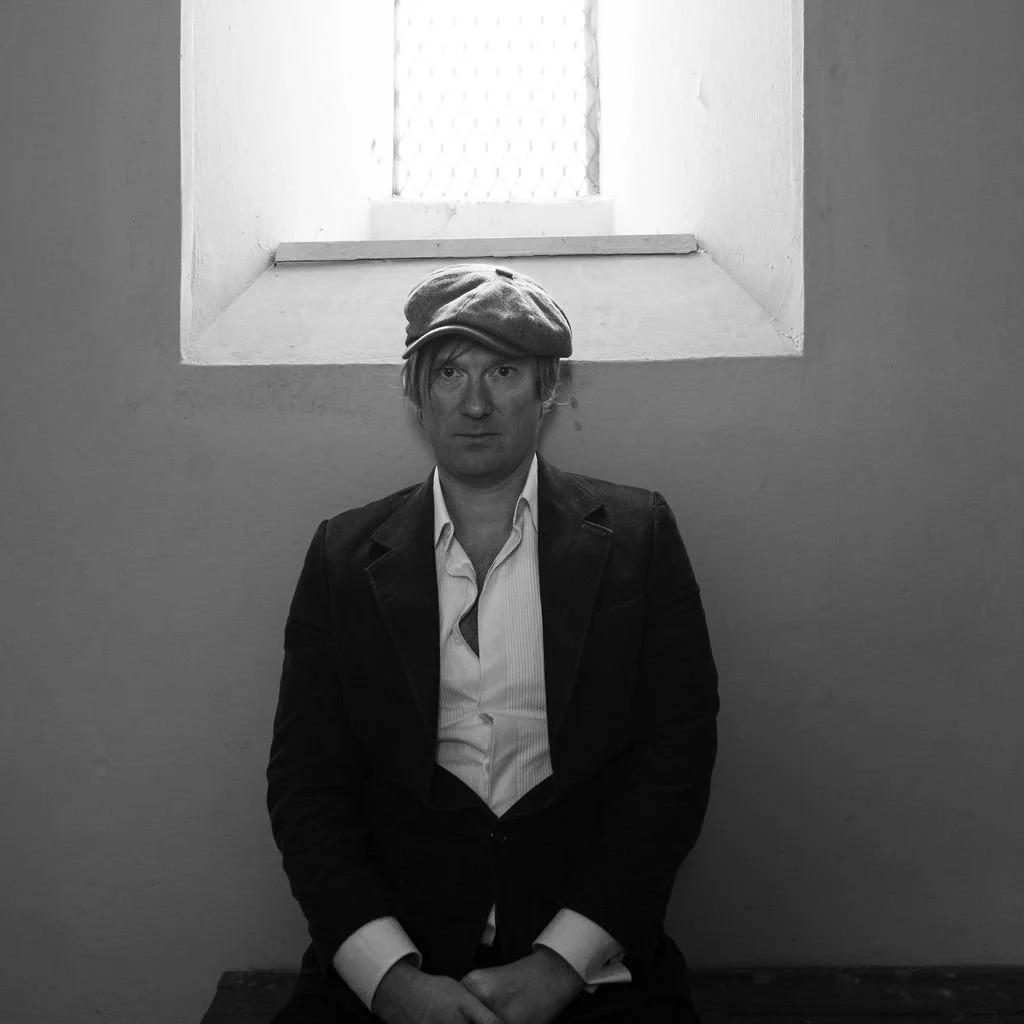Grunge Hero Dean DeLeo: Nurtured On Prog-Rock
UP CLOSE
⭐️
Dean DeLeo
⭐️
UP CLOSE ⭐️ Dean DeLeo ⭐️
Dean DeLeo in Atlantic City by Emily Paine
Stone Temple Pilots didn’t start grunge but they certainly furthered it. Lead guitarist Dean DeLeo, 37 years into his career, wanted to make a solo instrumental album. Somehow, though, the project morphed into a collaboration with British singer-songwriter Pete Shoulder and the result—One More Satellite—is one of the more compelling rock albums of the year. Dean and his brother Robert were born in Montclair and graduated Point Pleasant High School before venturing out west to California in 1988 to start STP.
The Jersey Sound: What led you away from your original idea of an all-instrumental album?
Dean DeLeo: There’s no denying Pete’s talent. He sang on a couple of songs as originally intended but he was so good that he just wound up singing on eight of the ten.
TJS: My favorite is “Long Way Down.” I blasted that track so loud. I hope my neighbors liked it. It’s almost like the original spark, the DNA of rock’n’roll itself, manifested itself into those grooves.
DD: Great, man. That’s good to hear. Thank you. So many musicians are from Jersey! And it actually goes way beyond that. Look at all the Hollywood actors who came out of our little state, man. I think there’s this vortex of longitude and latitude that just spawns a lot of actors.
[Author’s Note: Danny DeVito, Jack Nicholson, Bruce Willis, Joe Piscopo, Abbott & Costello, Michael Douglas, James Gandolfini, Joe Pesci, Kirsten Dunst, John Travolta, Ray Liotta, Anne Hathaway, Meryl Streep, Zoe Saldana, Kavin Spacey, Ed Harris, Lee Van Cleef, Peter Dinklage, Zach Braff, Jason Alexander, Bobby Cannavale, Paul Rudd, Nathan Lane, Ernie Kovacs, Jane Krakowski, Jerry Lewis, Roy Scheider, Vera Farmiga and Michael B. Jordan are all from New Jersey.]
“Growing up, I was very much into the ‘70s prog-rock movement ... I just thought it so fascinating to follow the careers of these guys and what they did after the original bands that brought them fame.”
TJS: You grew up in Point Pleasant. I used to go there to party.
DD: I’m sure you did. It was quite a little destination spot.
TJS: It really was. Unlike Belmar and Ocean Grove (we used to call it Ocean Grave) which were just dead towns we used to walk through on the boardwalk from Bradley to Asbury, Point Pleasant was rockin’ at one time.
DD: Yeah! It was a great place to grow up, man.
TJS: So what made you leave?
DD: Well, um, y’know, I wanted simply to broaden my horizons, man. I knew once Rob and I kinda put our heads together, something was going to happen, musically speaking.
TJS: That’s because you guys are such great musicians. It comes out on that classic “MTV Unplugged” that Stone Temple Pilots did, which I think is one of the best damned “Unplugged’s” of ‘em all. You really showed your six-stringed wizardry. And the vocals were SO good. On the new album, during “Drowning Out The Sun,” you engage in some absolutely beautiful finger-picking, almost as a prelude to when the drums come in, making that much more dramatic.
DD: That’s my son, Rocco, playing on that track. It’s really a “proud papa’ moment. He also played on “Willow Mae” and “Spit It Out.” Being in the studio with him was one great afternoon for me. Really lovely day, man. The greatest part about it is to see his name on the credits. That was really nice.
TJS: Then, after another instrumental, “Can Of Worms” has enough changes for three separate songs.
DD: Y’know what’s an interesting song? When’s the last time you heard “Me And Sarah Jane” by Genesis? It’s a four-minute song, but I swear there’s like five different song arrangements. Every part they go into is like really incredible, man. What a beautiful song!
TJS: So the grunge dude is a prog-rock fan!
DD: Well, I’m not gonna lie, man. Growing up, I was very much into the ‘70s prog-rock movement. I loved Yes! We even got Jon Anderson to sing on the Trip The Witch record. I was also very much moved by King Crimson. And I made sure to follow each of their careers and what they did afterwards. I knew everything that Bill Bruford and Adrian Belew did. Robert Fripp, too, of course. The stuff he did with Bowie, oh man. David Byrne too. All the stuff he did after Talking Heads, the collaborations with Brian Eno, the Afro-Cuban stuff. Plus British guitarist Allan Holdsworth, I glommed on to almost everything he ever did. He really put it all together in so many genres. I just thought it so fascinating to follow the careers of these guys and what they did after the original bands that brought them fame.
Dean DeLeo by Emily Paine
TJS: My other favorite, “Spit It Out,” houses a duality wherein the disparity between the beauty and the rage makes the rage all the more explosive. Your son’s a solid drummer!
DD: Thank you. The thing for me, I mean, [vocalist] Pete [Shoulder] is in England. For “Drowning Out The Sun” and “Willow Mae,” he just happened to be over here, and he cut those vocals here. But on “Spit It Out,” for instance, we would work out an arrangement during a Trans-Atlantic phone call and then I would go in and cut it here musically top to bottom before sending it to him to add vocals which he would add before sending it back.
TJS: It’s amazing how cohesive it sounds considering.
DD: Pete’s the kind of singer where, for me, I’m in on his first line. He has me. There’s no doubt that—wow!—he is really really good. What can I say? He’s just so great.
TJS: Yeah, he totally complements your ideas to add his own thing. The song my music teacher wife liked the most—“Pull Back The Veil”—is the longest track on the album at over six minutes and again it could’ve been three different songs. Stunning arrangement!
DD: I think that’s just one concerted effort that we always try to do, and that goes for any of the bands I’ve been in from STP and Army Of Anyone to Trip The Witch and Talk Show. It’s just to try to almost impress yourself, really, not only with what key the song is in—we try to spread that out a little bit—and the arrangement plus the production to it all adds up to a mix that is never ever formulaic.
TJS: It’s almost prog! So you’re sort of a man for all seasons, so to speak. I understand you took the name of the CD—One More Satellite—from a ‘90s alt-rock band called Failure.
DD: I did. I absolutely adore Failure. I’ve known that band’s Ken Andrews for quite some time. He mixed the Army Of Anyone record. He also mixed the [2018] Butterfly record, which is the first album STP did with [singer] Jeff [Gutt]. I’ve been a huge fan of Failure for a long time. They did a record called The Heart Is A Monster [2015] and there’s a song on there called “Counterfeit Sky” which is just incredible and I lifted the title of our album from a line in that song.
“From CSNY to Cat Stevens, from CCR to the Stones! Think about it, man. You could turn on AM Radio—because that’s what we had in the car back then—and hear “Goodbye Yellow Brick Road,” something off of Tapestry, Brazilian bossa nova and “Wild Horses.” It was all considered part of pop music back then. Back-to-Back! It was the best of the best, man.”
TJS: Such an obscure reference. Gotta go hear that now. So let me get this straight. STP bursts on the scene in ’92 with Core and it goes up to #3, you tour incessantly in ’94, do that great “MTV Unplugged,” win a Grammy, and release Purple which debuts at #1. Tiny Music comes out in ’96.” No. 4 comes out in ’99 and goes platinum. Shangri-La Dee Da comes out in 2001. Then it all stops in 2003 and five years of silence ensues. Why?
DD: [pause] We, uh, had some growing pains, man. We just weren’t firing on all pistons anymore.
TJS: But you were top-of-the-pops having sold millions and millions of records.
DD: [softly] Yeah, I know. But I didn’t really do much from ’03 to ’08, true. I mean, sure, we did the Army of Anyone thing.
TJS: That was heralded as a super-group at the time what with you, your brother Robert plus Richard Patrick from Filter and Ray Luzier of David Lee Roth’s band (and later Korn).
DD: Yeah, that was a real nice record to make. Richard and Ray were so great to work with. We had to much fun making that record. We also toured behind it. So yeah, there’s always music going on, man, one way or another.
TJS: And I always thought that Talk Show record was terrific.
DD: Aah, yeah. I don’t even remember what year that was. [laughing] That one was SO long ago. It’s blurry, Mike, it’s blurry.
Dean DeLeo by Wendy Bird
TJS: It was 1997 while STP singer Scott Weiland was dealing with his drug problem. So my point is that here’s all this solid sound by two kids from the Jersey Shore that winds up expanding the scope of 1990s rock’n’roll. It’s simply amazing. But back to the future: you gotta be anticipatory of what the reaction to One More Satellite will be and you have to be really satisfied with its final mix.
DD: I am. A big big part of the sound of One More Satellite is our dear friend Ryan Williams. He engineered and mixed STP’s Perdida record [2020], the Trip The Witch record we did with Yes singer Jon Anderson [2021], One More Satellite [2025] and my brother Robert’s solo record, Lessons Learned [2022]. We’ve known him a long time, having met at Southern Tracks where we worked with [producer] Brendan O’Brien a lot in 1996 and Ryan was his second engineer. We were just starting the Tiny Music record. I’ll tell ya, Mike, Ryan is a big part of why each of those records sounds the way they do. Pristine. He’s an extraordinary talent. And he’s really great to work with. Plus, he’s such a good musician! He gets it, he really gets it.
TJS: You’re pretty righteous in giving kudos to others, be it the new record’s Pete Shoulder or producer Ryan or your brother. But it’s your guitar playing that holds a lot of these projects together. I maintain you’re up there with Steve Howe and Martin Barre. You’re obviously not in the Beck-Page-Clapton mode only because that’s a blues-rock thing and you’re not. So who floats your boat?
Pete Shoulder
DD: I love how you mention Howe. He’s the perfect example. I mean, let’s just look at electric guitars. Y’know, when you pick up a Telecaster, as opposed to when you pick up a big Gibson arch-top jazz-box, you approach both so differently. Pick up a Tele and you wanna do some chicken-pickin’ on it! It’s the guitar that dictates what you play. I mean, I just mentioned two guitars but think of all the instruments you can pick up…like a dobro. You can approach guitar with a slide. You can pick up a nylon-stringed guitar, or a steel-stringed guitar. What I’m trying to say is that there’s just SO many facets of that one particular instrument. And that’s why I say that Steve Howe of Yes really does demonstrate the broad usage of the guitar’s capabilities. He can do it all. I don’t want to say he spread himself thin because there’s nothing thin about it but all those Yes albums, man, they’re in my DNA. That stuff still, to this day, really resonates with me.
TJS: I hear ya, Bro. And I’m right there with you. I will never forget seeing Yes from the first row tripping my brains out and watching Steve, particularly Steve, yeah.
DD: [laughing] I love it! How old are you?
TJS: 74. Six when watching Elvis on The Ed Sullivan Show, 13 when watching The Beatles on the same show, 18 at Woodstock…
DD: Oh man, yeah, you’re 10 years older than me. Don’t you just feel so fortunate that you got to see what was happening in music in the ‘60s and ‘70s. To me, at 64, that was the greatest era but I really was too young for some of it. You weren’t.
TJS: Yeah, I even got to see The Doors.
DD: You saw the fucking Doors? Damn! Man, that era, I mean, from CSNY to Cat Stevens, from CCR to the Stones! Think about it, man. You could turn on AM Radio—because that’s what we had in the car back then—and hear “Goodbye Yellow Brick Road,” something off of Tapestry, Brazilian bossa nova and “Wild Horses.” It was all considered part of pop music back then. Back-to-Back! It was the best of the best, man. And y’know, Robert and I put a nipple on that and drank from it! What was it like seeing The Doors?
TJS: I won’t ever forget that feeling of not knowing what the crazy lead singer was going to do next.
DD: Oh wow, I know exactly what you mean. Hey, did you ever see shows at what used to be called the Garden State Arts Center?
TJS: Of course. I love that venue.
DD: My mom took Robert and I to see The Carpenters and I fell in love with Karen Carpenter. They had a complete orchestra with them. It was the summer of [singing] “I’ll say goodbye to love.” That was their big hit at the time.
TJS: Was she playing drums?
DD: Yeah, she came out in this beautiful yellow gown but got right behind the kit. I saw a lot of shows there. I particularly remember a great show there by Peter Gabriel.
TJS: There’s another great open-air venue in Camden now too on the waterfront where the acoustics are great.
DD: You’re so right. We played there a bunch! Always loved playing there.
TJS: Hope you don’t mind, but I gotta ask you about the late Scott Weiland.
DD: [long pause] I can sum him up in one word: brilliant. He was brilliant. Period. And it’s funny because I see that more now and I get to hear it more now because like when I’m in the car—and I don’t usually have the radio on but when I do—and one of our older songs comes on, oh man. This just happened to me the other day, in fact. “Creep” came on. I was able to listen to it rather objectively: as more of a listener than one who made it and when he hears it now can only think, “is that hi-hat part loud enough?” You know what I mean? So I listened. Really listened. Thirty years later. And I could really feel his brilliance. He was just so great, man. In fact, I was just saying this to someone the other day. When I had the luxury of being onstage with Scott, I felt, uh, fancy. And that’s why there’s so many moods we set with this One More Satellite record. I mean, I hope it’s cohesive but it’s certainly the kind of music I myself would enjoy listening to.
